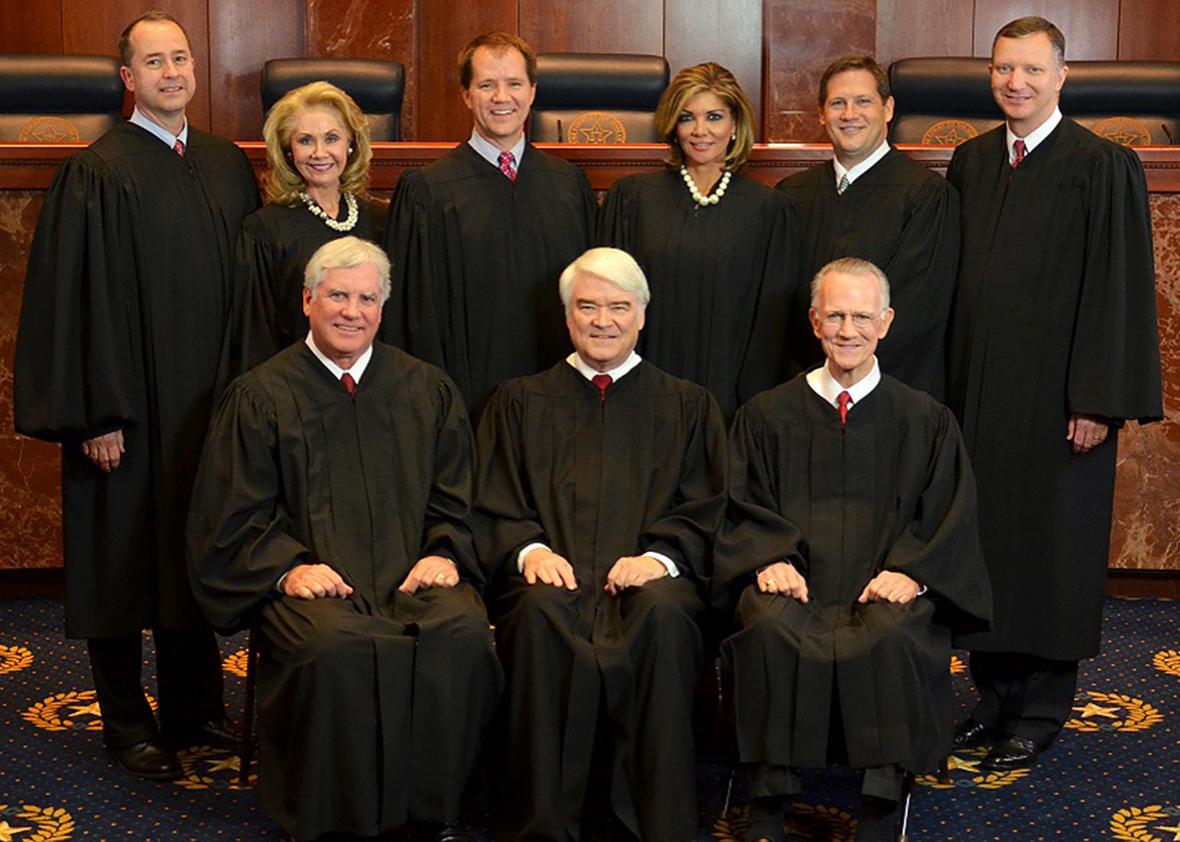Back in September, the Texas Supreme Court refused to review a lower court ruling that cities may not deny married same-sex couples the benefits it provides to opposite-sex couples. That was a sensible decision, since this is an easy question: The U.S. Supreme Court’s same-sex marriage decisions undoubtedly prohibit the government from depriving couples of marriage rights merely because they are gay. Yet the Texas Supreme Court’s inaction prompted outrage from state Republican officials and anti-gay activists, who urged the justices, who are elected, to take the case and allow Texas cities to discriminate against same-sex couples. And on Friday, the court took the first step, caving to Republican demands and agreeing to hear the case in March—a worrying sign that the justices, fearful of a re-election fight, may soon yield to political pressure and roll back marriage equality in Texas.
To grasp why the court’s Friday reversal is so worrying, it’s important to understand that the argument in favor of anti-gay discrimination is extraordinarily weak, almost embarrassingly so. Here’s the background: In 2013, a same-sex couple sued Houston for depriving gay city employees of spousal benefits. The city attorney advised the mayor that, in light of United States v. Windsor, the couple was correct that the city policy violated the Constitution. In response, the mayor agreed to provide spousal benefits to all couples, gay or straight. This concession enraged anti-gay advocates, who asked the courts to compel Houston to enforce its anti-gay benefits policy. Eventually, an appeals court sided with the city, finding that the anti-gay policy did, indeed, violate the U.S. Constitution and thus could not be enforced. (That’s the decision the Texas Supreme Court will now review.)
How could an explicitly anti-gay spousal benefits policy pass muster in light of Windsor and Obergefell, which established a constitutional right for same-sex couples to marry? Gay rights opponents alleged that these decisions were essentially limited to same-sex couples’ right to obtain a marriage certificate—and that the government retains the power to deny them other rights and privileges associated with marriage. As long as states let gay people get married, they argue, the government can still treat their marriages as inferior to opposite-sex unions.
At least one Texas Supreme Court justice is on the record endorsing this theory. Justice John Devine, the court’s fiercest culture warrior, wrote in September that the court should have taken the case and permitted Houston (and other Texas cities) to refuse spousal benefits to same-sex couples. “Marriage is a fundamental right,” Devine wrote. “Spousal benefits are not.” He explained that Texas has an “interest in encouraging procreation,” speculating that “offering certain benefits to opposite-sex couples would encourage procreation within marriage.”
After all, benefits such as health insurance provide financial security as couples decide whether to have a child. An opposite-sex marriage is the only marital relationship where children are raised by their biological parents. In any other relationship, the child must be removed from at least one natural parent, perhaps two, before being adopted by her new parent(s). This does not diminish any child’s inherent dignity, a fact the City presumably recognizes by extending benefits to their employees’ children regardless of the employees’ marital status. But it does explain why the State might choose to direct resources to opposite-sex couples.
The problem with this argument is that it is entirely, explicitly, indisputably foreclosed by Windsor and Obergefell. In Obergefell, the court did not merely guarantee marriage licenses to same-sex couples; it required states to recognize same-sex marriages “on the same terms and conditions as opposite-sex couples.” The meaning of this stipulation is pellucidly clear: When a state grants marriage-related rights—whether they relate to adoption or birth certificates or state employment benefits—it must provide them to all couples, gay or straight. Anything less constitutes a violation of the Due Process and Equal Protection clauses of the 14th Amendment.
Moreover, the notion that the government has a legitimate interest in favoring the biological children of opposite-sex couples over the adopted children of same-sex couples is just plain wrong. Indeed, Devine’s insulting claim is unequivocally proscribed by Windsor and Obergefell. When the Windsor court struck down the Defense of Marriage Act, it found that the law’s effect of “humiliat[ing]” the children of same-sex couples contributed to its unconstitutionality. “The law in question,” the court wrote, “makes it even more difficult for the children to understand the integrity and closeness of their own family and its concord with other families in their community and in their daily lives.” In Obergefell, the court held that the right to marry is constitutionally significant in part because it “safeguards children and families.” As Justice Anthony Kennedy opined:
Without the recognition, stability, and predictability marriage offers, their children suffer the stigma of knowing their families are somehow lesser. They also suffer the significant material costs of being raised by unmarried parents, relegated through no fault of their own to a more difficult and uncertain family life. The marriage laws at issue here thus harm and humiliate the children of same-sex couples.
Windsor and Obergefell, then, stand for the exact opposite of the proposition currently being asserted in Texas—that the government can deny marriage benefits to same-sex couples because their children are often non-biological and therefore less deserving. These cases considered and rejected that claim, deciding instead that the children of all couples, gay or straight, must receive the equal protection of the laws.
There is simply no honest or logical way to argue that Houston may constitutionally deprive same-sex couples of marriage benefits. Yet the Texas Supreme Court justices will soon devote considerable time to this painfully easy question—solely because Republican politicians and activists urged them to—and may arrive at the wrong conclusion because they fear a nasty re-election battle. The fight to roll back marriage equality in the Trump era has begun. And in Texas, anti-gay forces stand a good chance of scoring a devastating victory.
